 Petzlover
Petzlover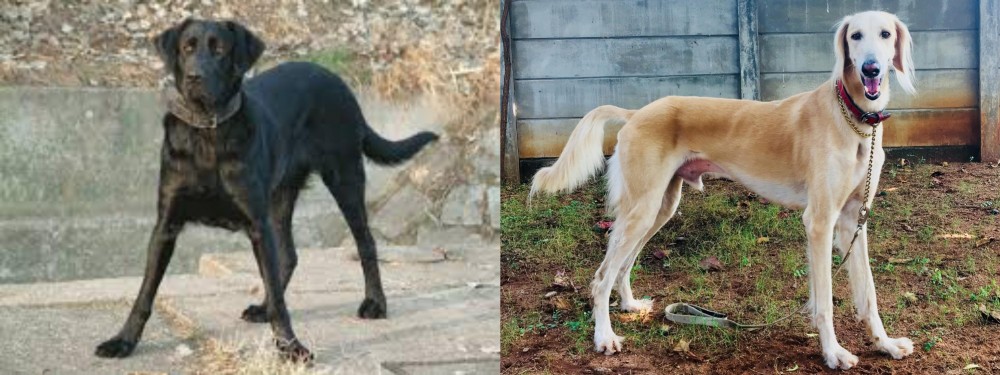 Cao de Castro Laboreiro is originated from Portugal but Saluki is originated from Iraq. Cao de Castro Laboreiro may grow 11 cm / 4 inches shorter than Saluki. Cao de Castro Laboreiro may weigh 40 kg / 89 pounds more than Saluki. Both Cao de Castro Laboreiro and Saluki has almost same life span. Both Cao de Castro Laboreiro and Saluki has almost same litter size. Cao de Castro Laboreiro requires Low Maintenance. But Saluki requires Moderate Maintenance
Cao de Castro Laboreiro is originated from Portugal but Saluki is originated from Iraq. Cao de Castro Laboreiro may grow 11 cm / 4 inches shorter than Saluki. Cao de Castro Laboreiro may weigh 40 kg / 89 pounds more than Saluki. Both Cao de Castro Laboreiro and Saluki has almost same life span. Both Cao de Castro Laboreiro and Saluki has almost same litter size. Cao de Castro Laboreiro requires Low Maintenance. But Saluki requires Moderate Maintenance
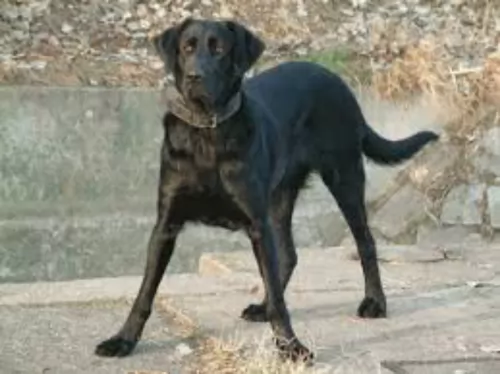 Cão de Castro Laboreiro originates from Portugal. Also known as the Portuguese Cattle Dog he was used long ago to guard livestock. Today, the modern Cao de Castro Laboreiro is descended from the molosser type dog.
Cão de Castro Laboreiro originates from Portugal. Also known as the Portuguese Cattle Dog he was used long ago to guard livestock. Today, the modern Cao de Castro Laboreiro is descended from the molosser type dog.
There are hints to the dog's origins from the 19th century, but changes in agricultural methods meant a disappearance of the dog as a livestock protector. Today the dog is mostly kept as a pet and was first seen at a dog show in 1914.
The Cão de Castro Laboreiro is recognized by the Fédération Cynologique Internationale as well as being recognized by the United Kennel Club in the United States.It is a rare dog and not many exist today but in Portugal, the USA and United Kingdom you will find a few breeders.
 It seems as though the Saluki's origins go far back to ancient Egypt times. The dog is known for its superb hunting abilities.
It seems as though the Saluki's origins go far back to ancient Egypt times. The dog is known for its superb hunting abilities.
These dogs have been known in the Middle East and could be found in Iran and Egypt too. Breeding with other dogs was forbidden so the Saluki has remained unchanged for thousands of years.
It has always been known over the centuries for its superb grace and speed as well as endurance. He is capable of that because of the tall, sleek, muscular body and long, narrow head.
The Saluki came to England in the 1900s, and today the dog comes in quite a few variations.
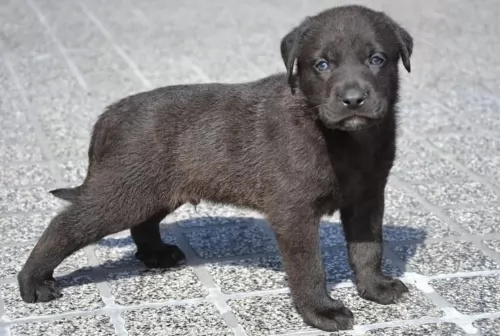 The Cão de Castro Laboreiro is a large dog, with height being in the region of 55 to 60cm and weight being in the region of 45 - 70kg. People describe the dog as wolf-like with a coat that is fairly short, thick and course. The coat is brindle with a base color of shades of grey, chestnut and black.
The Cão de Castro Laboreiro is a large dog, with height being in the region of 55 to 60cm and weight being in the region of 45 - 70kg. People describe the dog as wolf-like with a coat that is fairly short, thick and course. The coat is brindle with a base color of shades of grey, chestnut and black.
This large mastiff-type dog always has a black nose, his tail is long and carried high, but never curling over the back. He has a broad head and is much like the Labrador in looks, being free of wrinkles on the face.The ears of the Cao de Castro Laboreiro are medium-in-size and floppy while the eyes are dark brown.
The Cao de Castro Laboreiro makes an excellent pet as he forms strong bonds with his human family. He is territorial and makes an exceptional guard dog. He doesn’t particularly like strangers and is aloof around them.
This is an intelligent dog breed, he is strong-willed and stubborn, but when he is around the children in the family he is gentle and loving. When he has been trained and socialized, which is always highly recommended with every dog, he gets along with other pets in the home too.
 The Saluki is a graceful, elegant looking dog, deep chested and long legged, much like the Greyhound and fairly closely related to the Afghan Hound.
The Saluki is a graceful, elegant looking dog, deep chested and long legged, much like the Greyhound and fairly closely related to the Afghan Hound.
They stand at between 58 and 71cm and weigh between 16 to 29kg. The head is long and narrow, the eyes large and the dog has floppy ears. The tail is long and curved. The coat of the Saluki comes in a number of different colours and these can be fawn, cream, white, tan, some black or it can have a blend of all these colours. The coat of this dog comes in two types - smooth and the feathered type. The fur is always beautifully silky and is considered to be low-shedding.
These dogs are also very fast runners, and if you check the Guinness Book of Records, you’ll see that the Saluki is listed there as being one of the fastest dogs with tremendous stamina.
Th Saluki is a beautiful, quiet, dignified, reserved, loyal dog. You can just see that he is intelligent. He is certainly affectionate with his human family but you wouldn’t call him demonstrative. He isn’t the kind of dog to be wildly prancing around wagging his tail furiously.
He’s the kind of dog that likes to give chase so you’ll need a large garden for him. It’s why he isn’t suited for city life on a small property. The countryside is a far better option for this tall dog.
When he’s not outdoors, he can easily curl up on your sofa for a few hours of utter relaxation. Training and socialization will be necessary for this shy dog as it not only makes him obedient, but it gives him some confidence with knowing how to behave in different circumstances. He’ll get on well with older children, but is fairly indifferent and intolerant to small kids, especially those that are undisciplined and left to climb over him.
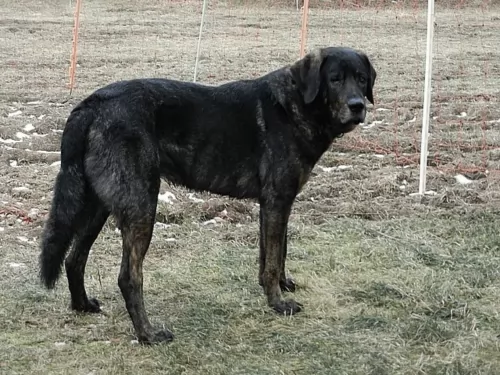 Environment and upbringing have plenty to do with how a dog turns out. People who just buy a dog for guardian purposes and nothing else can’t expect companionship in return.
Environment and upbringing have plenty to do with how a dog turns out. People who just buy a dog for guardian purposes and nothing else can’t expect companionship in return.
The Cão de Castro Laboreiro has always been a fearless guardian of livestock with his strong protective characteristics. He is intelligent and recognizes that a child in the family needs his protection.
This is a large dog who is strong, brave and intelligent but with his human family he is gentle, loving and loyal. Nonetheless he still requires a firm owner, and if you’re fair and firm with him you get the best with him. With this dog you can form a close friendship and bond.
 The Saluki loves his human family, and he’s the kind of dog that wouldn’t like to be owned by one family ad then given away to another later on. That's why make sure when you get your Saluki your intentions are to keep him.
The Saluki loves his human family, and he’s the kind of dog that wouldn’t like to be owned by one family ad then given away to another later on. That's why make sure when you get your Saluki your intentions are to keep him.
He likes to be comfortable too when they’re not running outside, and a good bed is important to him. Salukis are naturally thin, so make sure not to overfeed him. These are quiet, calm dogs, but over the centuries they've been making reliable, steadfast pets and companions.
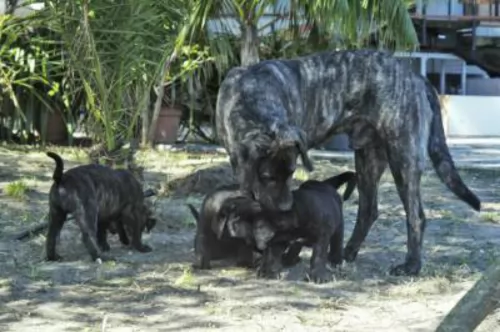 The Cão de Castro Laboreiro is generally a healthy breed, but even so, it is good to be aware of typical canine diseases that your pet may develop.
The Cão de Castro Laboreiro is generally a healthy breed, but even so, it is good to be aware of typical canine diseases that your pet may develop.
There are many eye problems that dogs have to contend with and if you see any kind of ulceration in your dogs eye, get veterinary advice.
A dog should always have access to a shady spot. Never ever leave your dog in a hot car. Heat builds up quickly and death can result soon as the body temperature rises.
Roundworm and tapeworm can infest dogs and you’ll need to speak to your vet about a worming program. Lice, mites and ticks are all parasites which attach themselves to the skin.
 We always mention hip dysplasia as a common dog ailment as so many dog breeds can succumb to this ailment. With the Saluki, hip dysplasia is uncommon. Cancer and cardiac issues are more prevalent with these dogs.
We always mention hip dysplasia as a common dog ailment as so many dog breeds can succumb to this ailment. With the Saluki, hip dysplasia is uncommon. Cancer and cardiac issues are more prevalent with these dogs.
It is sad to realize that dogs are susceptible to the same types of cancer as people are. If the uncontrolled growth of cells in the body isn’t discovered in time, cancer can reach the circulatory or lymph systems and other parts of the body. In fact, cancer is the leading cause of death with dogs. The good news is that it is treatable if you catch it in the early stages.
One of the more common types of cancer in dogs is Lymphoma. This can affect any dog, and at any age too. There are swollen lymph nodes under the neck and the dog can have trouble with breathing and digestion. You’ll notice lumps underneath the dog's skin, abnormal discharges from the eyes, ears or rectum, non-healing wounds, coughing and pain.
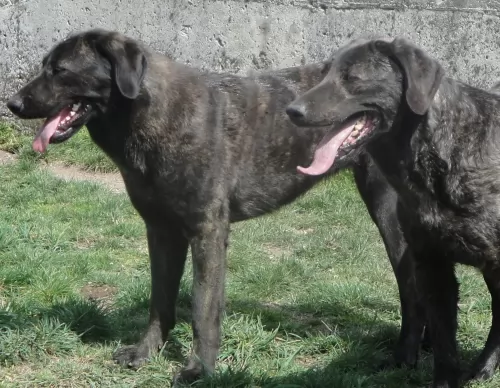 The Cao de Castro Laboreiro has a short coat which requires minimal grooming. Brushing him twice a week to rid him of loose hairs will suffice.
The Cao de Castro Laboreiro has a short coat which requires minimal grooming. Brushing him twice a week to rid him of loose hairs will suffice.
Nail clipping as well as ear- and teeth cleaning are other routine maintenance procedures for your pet.
The food you give your pet must be well-balanced and have protein and carbohydrates. If you want his skin and hair to remain healthy, vitamins, fatty acids and minerals will also be needed.
Boneless chicken and fish, brown rice and vegetables can be a good choice as well as some of the top quality commercially manufactured foods. An active dog will always need a higher protein content and therefore including raw meat into the diet is imperative – not every day as it can be very expensive, but every other day.
Remember that bones can be dangerous as they can splinter and cause your pet internal damage. Fresh, cool water must be available at all times.
 These tall, slender dogs love to run free and it's the kind of dog that will need regular and different forms of exercise.
These tall, slender dogs love to run free and it's the kind of dog that will need regular and different forms of exercise.
Provide your Saluki with a comfortable, warm, dry bed with lots of padding.
The Saluki has smooth, silky hair so brush it twice a week to keep it gleaming.
To help your Saluki have a strong immune system, he needs the best food there is. Good food packed with vitamins and minerals instead of preservative and colorants will help him fight diseases like cancer.
Commercially manufactured dog foods can be wonderfully convenient and nutritious if you get the better quality ones. Give him some home-made food too and add it twice a week to the dry kibble. This will provide variety and a tasty treat. Boiled chicken, brown rice, sweet potatoes, carrots and spinach are simple foods – just like dogs want.
Try and include some raw meat occasionally. Fresh, cool water should always be available around the clock.